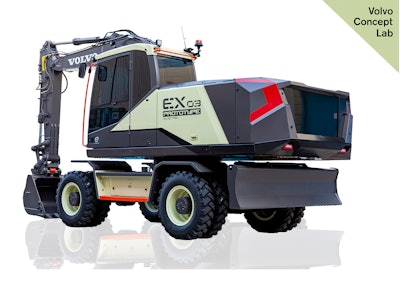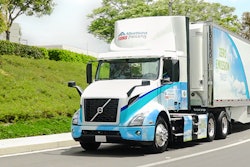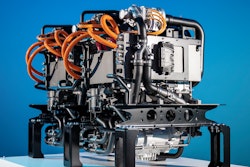
Volvo Group has taken a leading industry position in the transition to electrification, currently offering electric vehicles and equipment ranging from city buses and trucks for construction, waste management and urban distribution, to compact excavators and loaders. Most recently, the company announced exploration into the mid-size construction equipment market with its prototype model EX03 electric wheeled excavator. The company indicates it will roll out further electric vehicles and related services at a high pace – including heavy-duty trucks for regional transport or construction, later this year.
As it continues its drive toward a more electric future, the company has formed a new business area dedicated to accelerating electrification. Volvo Energy will have an internal role in providing batteries and charging solutions to Volvo Group’s other business areas, as well as an external role offering used, remanufactured and refurbished batteries to customers for use across various applications. The intent is for Volvo Energy to strengthen the group’s business flow of batteries over their life cycle, while expanding the offering of charging infrastructure to customers. It will also help to limit the environmental impact from electric and hybrid electric commercial vehicles and machines by giving used batteries a second life.
 The new concept EX03 electric prototype excavator.Volvo Construction Equipment
The new concept EX03 electric prototype excavator.Volvo Construction Equipment
“There is a great and growing interest for electric vehicles and machines among our customers. This is, of course, very positive as it accelerates the transition toward more sustainable transport solutions,” says Martin Lundstedt, President and CEO, Volvo Group. “Our ambition is to offer our customers the most competitive solutions when it comes to electrification, including batteries and charging infrastructure. With Volvo Energy, we are taking a holistic view of the entire life cycle, which benefits both our customers’ business and society as a whole.”
In addition to supplying new battery solutions, Volvo Energy will seek to extend batteries’ life cycle, thereby conserving natural resources. As Volvo Group points out, batteries used in commercial vehicles typically have a service life of many years before they need to be replaced or remanufactured/refurbished. Even when it comes time for new batteries to be installed, the used batteries will generally still have considerable life left, which makes them suited for energy storage purposes in applications such as in buildings or in green energy production.
Volvo Energy will be further responsible for aiding in development of hydrogen infrastructure solutions for fuel cell electric vehicles. This will include collaborations with various business partners and players across the sector.
“With Volvo Energy, we are further increasing our focus on this important area. We are also giving vehicle batteries a second life, which is both a business opportunity and a way to contribute to the creation of a circular economy and a fossil free society," says Lundstedt.  Joachim Rosenberg will head the new Volvo Energy business.Volvo Group
Joachim Rosenberg will head the new Volvo Energy business.Volvo Group
Starting in February, Joachim Rosenberg, member of the Volvo Group Executive Board and Chairman of UD Trucks, will lead the effort to create Volvo Energy, while also continuing to run UD Trucks and preparing the transfer of UD Trucks ownership to Isuzu Motors as part of the previously communicated strategic alliance between the Volvo Group and Isuzu Motors. The financial results for Volvo Energy will be reported as part of the Truck segment.
Information provided by Volvo Group and edited by Becky Schultz, Editor of Equipment Today, a sister publication of OEM Off-Highway.



















